
Dolly Rebecca Parton is an American singer-songwriter, actress, and philanthropist, known primarily for her decades-long career in country music. Widely considered to be one of the top cultural icons in American history, after achieving success as a songwriter for others, Parton made her album debut in 1967 with Hello, I'm Dolly, which led to success during the remainder of the 1960s, before her sales and chart peak came during the 1970s and continued into the 1980s. Some of Parton's albums in the 1990s did not sell as well, but she achieved commercial success again in the new millennium and has released albums on various independent labels since 2000, including her own label, Dolly Records.

"I Will Always Love You" is a song written and originally recorded in 1973 by American singer-songwriter Dolly Parton. Written as a farewell to her business partner and mentor Porter Wagoner, expressing Parton's decision to pursue a solo career, the country single was released in 1974. The song was a commercial success for Parton, twice reaching the top spot of the US Billboard Hot Country Songs chart: first in June 1974, then again in October 1982, with a re-recording for The Best Little Whorehouse in Texas soundtrack.

Here You Come Again is the nineteenth solo studio album by American entertainer Dolly Parton. It was released on October 3, 1977, by RCA Victor. The album was a commercial success, peaking at number 20 on the US Billboard 200 and at number 2 on the Hot Country Albums chart and also being nominated for Favourite Country Album at the American Music Awards. It became Parton's first album to be certified platinum by the Recording Industry Association of America for shipping a million copies. The lead single and title track was also a success, entering the top five of the US Billboard Hot 100 and being nominated for Favourite Country Single at the American Music Awards.

Trio is a collaborative album by American singers Dolly Parton, Linda Ronstadt, and Emmylou Harris. It was released on March 2, 1987, by Warner Bros. Records. The album has platinum certification in the U.S. for sales of one million copies, and has total worldwide sales of approximately four million. A second collaborative album, Trio II, was released in 1999.

Coat of Many Colors is the eighth solo studio album by American singer-songwriter Dolly Parton. It was released on October 4, 1971, by RCA Victor. The album was nominated for Album of the Year at the 1972 CMA Awards. It also appeared on Time magazine's list of the 100 Greatest Albums of All Time and at No. 257 on Rolling Stone's 2020 list of the 500 Greatest Albums of All Time. Parton has cited the title track on numerous occasions as her personal favorite of all the songs she has written.
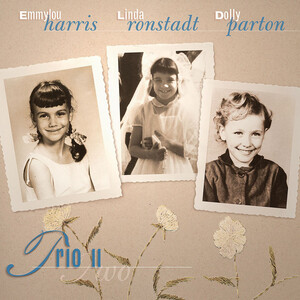
Trio II is the second collaborative studio album by Dolly Parton, Emmylou Harris and Linda Ronstadt. It was released on February 9, 1999, by Asylum Records.
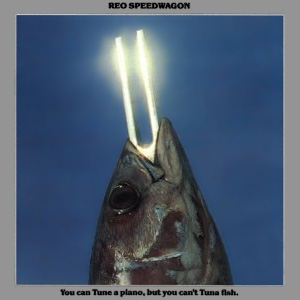
You Can Tune a Piano, but You Can't Tuna Fish is the seventh studio album by REO Speedwagon, released in 1978. It was their first album to be co-produced by lead singer Kevin Cronin and lead guitarist Gary Richrath. The album was REO's first to make the Top 40, peaking at No. 29. The album sold over 2 million copies in the US, which led it to being certified 2× Platinum.
"Light of a Clear Blue Morning" is a song written and recorded by American entertainer Dolly Parton. The song first appeared on her 1977 New Harvest...First Gathering album, and provided a top twenty country music hit for her as a single. As Parton has told interviewers over the years, "Light of a Clear Blue Morning" was her "song of deliverance," coming out of the pain from her break with longtime musical and business partner Porter Wagoner. Parton left Wagoner's band in 1974, in an effort to aim her career in a more mainstream pop direction; Wagoner responded by taking legal action, and the next couple of years were reportedly painful for both performers. According to the unauthorized 1978 biography, Dolly, by Alanna Nash, "Light of a Clear Blue Morning" was written as Parton felt the figurative clouds lifting, as the fruits of her sacrifices of the previous few years were becoming apparent.

New Harvest...First Gathering is the eighteenth solo studio album by American entertainer Dolly Parton. It was released on February 14, 1977, by RCA Victor. It is significant for being Parton's first self-produced album, as well as her first effort aimed specifically at the pop charts.

9 to 5 and Odd Jobs is a solo studio album by American entertainer Dolly Parton. It was released on November 17, 1980, by RCA Records. A concept album about working, the album was centered on Parton's hit "9 to 5", which served as the theme song to the film of the same name, and topped both the U.S. country and pop charts. The album's two additional singles—a cover of Mike Settle's "But You Know I Love You" and a reading of "The House of the Rising Sun" – provided further country hits, with "But You Know I Love You" also reaching No. 1.
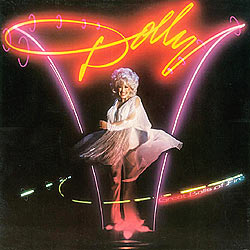
Great Balls of Fire is the twenty-first solo studio album by American singer-songwriter Dolly Parton. It was released on May 28, 1979, by RCA Victor. The album was produced by Dean Parks and Gregg Perry with Parton and Charles Koppelman serving as executive producers. The album peaked at number four on the Billboard Top Country Albums chart and number 40 on the Billboard 200. Two of the album's four singles charted in the top ten of the Billboard Hot Country Songs chart. "You're the Only One" topped the chart, while "Sweet Summer Lovin'" peaked at number seven. The album has been certified Gold in the United States.

Rhinestone is the soundtrack album from the 1984 film of the same name starring Dolly Parton and Sylvester Stallone. It was released on June 18, 1984, by RCA Victor. The album was produced by Mike Post and Parton. It peaked at number 22 on the Billboard Top Country Albums chart and number 135 on the Billboard 200. The Dolly Parton-composed soundtrack produced two top ten singles on the Billboard Hot Country Songs chart: "Tennessee Homesick Blues" and "God Won't Get You", which peaked at numbers one and ten, respectively.

Rainbow is the twenty-eighth solo studio album by Dolly Parton. It was released on November 25, 1987, by Columbia Records. The original plan, when Parton signed with CBS, was for her to alternate between releasing pop and country albums, but due to Rainbow's poor sales and tepid critical reception, the plan was quickly abandoned, and Parton more or less focused on recording country material for the remainder of her association with the label.
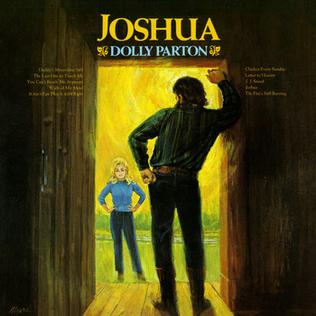
Joshua is the seventh solo studio album by American singer-songwriter Dolly Parton. It was released on April 12, 1971, by RCA Victor. The album was produced by Bob Ferguson. It peaked at number 16 on the Billboard Top Country Albums chart and number 198 on the Billboard 200 chart. The album's single, "Joshua", was nominated for a Grammy and was Parton's first song to reach number one on the Billboard Hot Country Songs chart.

My Blue Ridge Mountain Boy is the fourth solo studio album by American singer-songwriter Dolly Parton. It was released on September 8, 1969, by RCA Victor. The album was produced by Bob Ferguson. It peaked at number six on the Billboard Top Country Albums chart, Parton's first solo top ten, and number 194 on the Billboard 200 chart. The album spawned three singles: "Daddy", "In the Ghetto", and the title track. "Daddy" was the most successful, peaking at number 40 on the Billboard Hot Country Songs chart.

The Right Combination • Burning the Midnight Oil is the seventh collaborative studio album by Porter Wagoner and Dolly Parton. It was released on January 3, 1972, by RCA Victor.
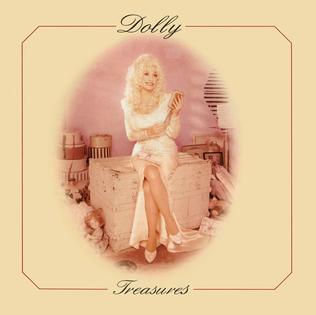
Treasures is the thirty-fourth solo studio album by American singer-songwriter Dolly Parton. It was released on September 24, 1996, by Rising Tide Records and Blue Eye Records. The Steve Buckingham-produced album is made up of covers of rock and country hits from the 1960s, 1970s, and 1980s. It peaked at number 21 on the Billboard Top Country Albums chart and spawned three singles: "Just When I Needed You Most", which peaked at number 62 on the Billboard Hot Country Singles chart; a dance remix of "Peace Train", which peaked at number seven on the Billboard Hot Dance Music chart; and a dance remix of "Walking on Sunshine". The album's release was accompanied by a CBS television special, Dolly Parton: Treasures.
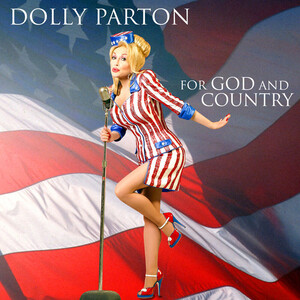
For God and Country is the fortieth solo studio album by American singer-songwriter Dolly Parton. It was released on November 11, 2003, by Welk Music Group and Blue Eye Records. The album was produced by Parton with Kent Wells and Tony Smith. It is considered Parton's musical attempt to deal with the aftermath of the September 11, 2001 attacks. Included are covers of famous patriotic songs and new Parton originals. The album is perhaps best remembered for its cover photo, depicting Parton posing as though appearing in a vintage USO poster.

The albums discography of American country singer-songwriter Dolly Parton includes 49 studio albums, four collaborative albums, nine live albums, six soundtrack albums, one extended play and approximately 222 compilation albums globally. Popularly referred as the "Queen of Country" by the media, she is also widely recognized as the most honored woman in country music history. She has charted 25 Number One songs, 41 Top 10 country albums and has sold more than 100 million records worldwide, making her one of the best selling female country artists in history. As of January 2022, Parton's catalog has amassed more than 3 billion global streams.

















